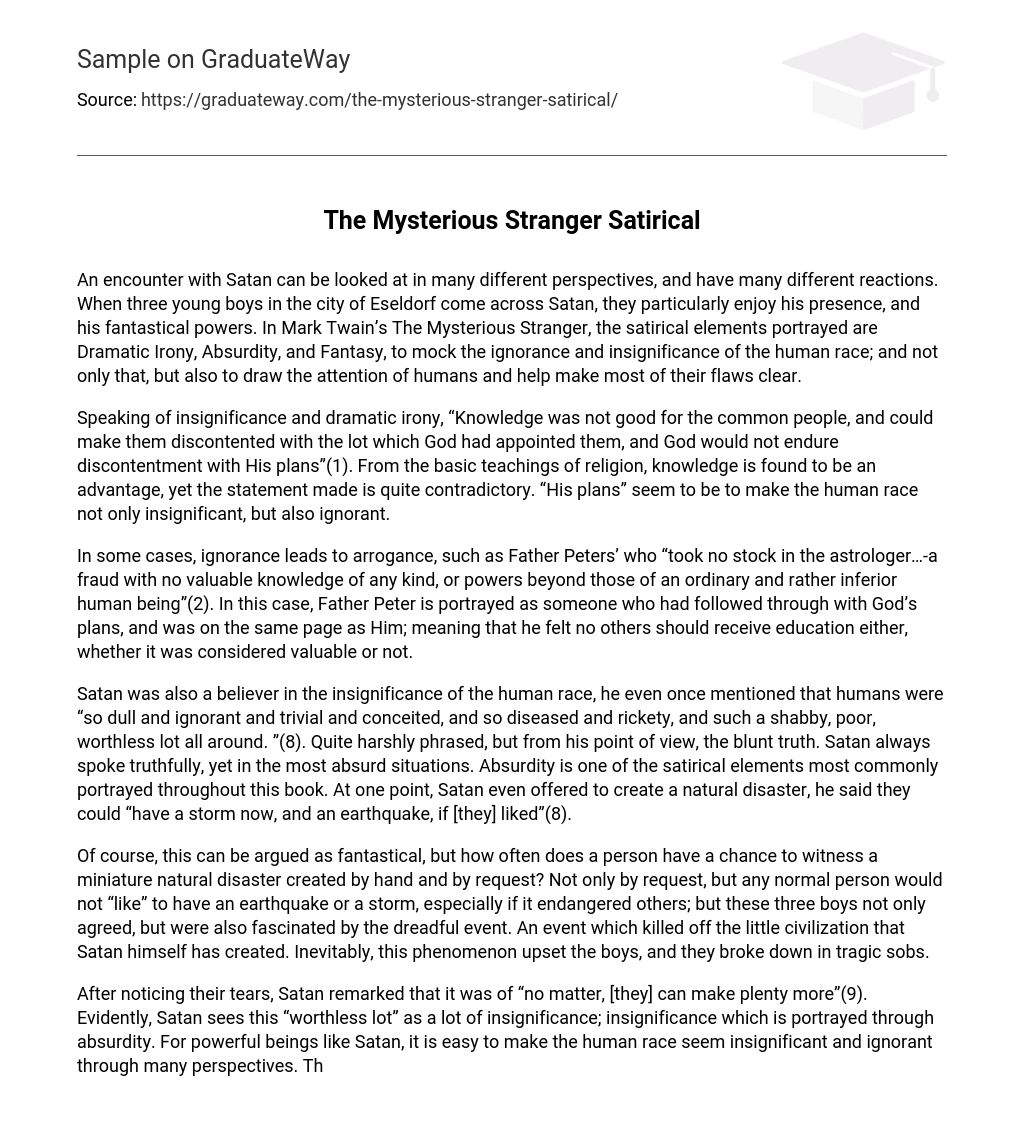An encounter with Satan can be looked at in many different perspectives, and have many different reactions. When three young boys in the city of Eseldorf come across Satan, they particularly enjoy his presence, and his fantastical powers. In Mark Twain’s The Mysterious Stranger, the satirical elements portrayed are Dramatic Irony, Absurdity, and Fantasy, to mock the ignorance and insignificance of the human race; and not only that, but also to draw the attention of humans and help make most of their flaws clear.
Speaking of insignificance and dramatic irony, “Knowledge was not good for the common people, and could make them discontented with the lot which God had appointed them, and God would not endure discontentment with His plans”(1). From the basic teachings of religion, knowledge is found to be an advantage, yet the statement made is quite contradictory. “His plans” seem to be to make the human race not only insignificant, but also ignorant.
In some cases, ignorance leads to arrogance, such as Father Peters’ who “took no stock in the astrologer…-a fraud with no valuable knowledge of any kind, or powers beyond those of an ordinary and rather inferior human being”(2). In this case, Father Peter is portrayed as someone who had followed through with God’s plans, and was on the same page as Him; meaning that he felt no others should receive education either, whether it was considered valuable or not.
Satan was also a believer in the insignificance of the human race, he even once mentioned that humans were “so dull and ignorant and trivial and conceited, and so diseased and rickety, and such a shabby, poor, worthless lot all around. ”(8). Quite harshly phrased, but from his point of view, the blunt truth. Satan always spoke truthfully, yet in the most absurd situations. Absurdity is one of the satirical elements most commonly portrayed throughout this book. At one point, Satan even offered to create a natural disaster, he said they could “have a storm now, and an earthquake, if [they] liked”(8).
Of course, this can be argued as fantastical, but how often does a person have a chance to witness a miniature natural disaster created by hand and by request? Not only by request, but any normal person would not “like” to have an earthquake or a storm, especially if it endangered others; but these three boys not only agreed, but were also fascinated by the dreadful event. An event which killed off the little civilization that Satan himself has created. Inevitably, this phenomenon upset the boys, and they broke down in tragic sobs.
After noticing their tears, Satan remarked that it was of “no matter, [they] can make plenty more”(9). Evidently, Satan sees this “worthless lot” as a lot of insignificance; insignificance which is portrayed through absurdity. For powerful beings like Satan, it is easy to make the human race seem insignificant and ignorant through many perspectives. The last one which was found often throughout this story was Fantasy. Satan makes a chromatic statement, saying that man is a “museum of diseases, a home of impurities; he comes to-day and is gone to-morrow; he begins as dirt and departs as stench” (11).
The insignificance of the human is being clearly portrayed. After Satan left some inhuman evidence in the town, “one or two shook their heads and said privately it looked more like the hand of Satan; and really that seemed a surprisingly good guess for ignorant people like that”(14). The statement is almost ironic, above fantastical, due to the cynical remark made that they finally took a good guess, as if they were too ignorant to make such an educated hypothesis. Yet again, humans are being portrayed as insignificant creatures, through cynicism; a slightly altered version of the satirical element: fantasy.
As shown, the insignificance and ignorance of the human race can be portrayed through many different aspects and points of view, three of which are Dramatic Irony, Absurdity, and Fantasy. Take note how elegantly it was portrayed through those three satirical elements, and how accurately it was represented. In Mark Twain’s The Mysterious Stranger, the satirical elements portrayed are Dramatic Irony, Absurdity, and Fantasy, to mock the ignorance and insignificance of the human race.
This book should serve as a guide, or as a tool to help humans not only learn their flaws, but also recognize them and accept them. Once that step has been taken, the next step would be to apply what is learned, and work on those flaws, and make sure they are not repeated. This book serves as a good example of how flaws of the human race can be embarrassingly shown in famous American literature, or any literature for that matter. Take a step back, recognize these flaws, exterminate them, and change for the better.





